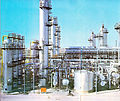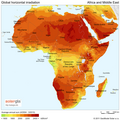Portal:Energy
| Main page | New articles & Tasks |
 The Energy Portal Welcome to Wikipedia's Energy portal, your gateway to energy. This portal is aimed at giving you access to all energy related topics in all of its forms.
|
Page contents: Selected article • Selected image • Selected biography • Did you know? • General images • Quotations • Related portals • Wikiprojects • Major topics • Categories • Help • Associated Wikimedia |
Introduction
Energy (from Ancient Greek ἐνέργεια (enérgeia) 'activity') is the quantitative property that is transferred to a body or to a physical system, recognizable in the performance of work and in the form of heat and light. Energy is a conserved quantity—the law of conservation of energy states that energy can be converted in form, but not created or destroyed; matter and energy may also be converted to one another. The unit of measurement for energy in the International System of Units (SI) is the joule (J).
Common forms of energy include the kinetic energy of a moving object, the potential energy stored by an object (for instance due to its position in a field), the elastic energy stored in a solid object, chemical energy associated with chemical reactions, the radiant energy carried by electromagnetic radiation, and the internal energy contained within a thermodynamic system. All living organisms constantly take in and release energy.
Due to mass–energy equivalence, any object that has mass when stationary (called rest mass) also has an equivalent amount of energy whose form is called rest energy, and any additional energy (of any form) acquired by the object above that rest energy will increase the object's total mass just as it increases its total energy.
Human civilization requires energy to function, which it gets from energy resources such as fossil fuels, nuclear fuel, or renewable energy. The Earth's climate and ecosystems processes are driven by the energy the planet receives from the Sun (although a small amount is also contributed by geothermal energy). (Full article...)
Selected article
There are many motivations to improve energy efficiency. Reducing energy use reduces energy costs and may result in a financial cost saving to consumers if the energy savings offset any additional costs of implementing an energy efficient technology. Reducing energy use is also seen as a solution to the problem of reducing carbon dioxide emissions. According to the International Energy Agency, improved energy efficiency in buildings, industrial processes and transportation could reduce the world's energy needs in 2050 by one third, and help control global emissions of greenhouse gases.
Energy efficiency and renewable energy are said to be the twin pillars of sustainable energy policy and are high priorities in the sustainable energy hierarchy. In many countries energy efficiency is also seen to have a national security benefit because it can be used to reduce the level of energy imports from foreign countries and may slow down the rate at which domestic energy resources are depleted.
Selected image

Photo credit: Johnson Space Center/NASA
Tropical cyclones feed on the heat released when moist air rises and the water vapor condenses.
Did you know?

- The 1,222 km long Nordstream pipeline between Russia and the Germany is the world's longest underwater pipeline?
- Due to the vast quantity of coal burnt in fossil fuel power plants, they cause more radioactive contamination than nuclear power plants?
- Chinese energy policy includes using renewable energy for the rural electrification of 3.5 million households by 2010?
- The 354 MW SEGS solar power plant (pictured) in the Mojave Desert is the world's largest?
- Known reserves of petroleum are typically estimated at around 1.2 trillion barrels, or at 3.74 trillion barrels if oil sands are included?
- The concentration of the greenhouse gas carbon dioxide has increased from about 280 parts per million to about 380 ppm since the start of the Industrial Revolution. That's an increase of 35.71%. The estimated population of the world in 1750 was 791 Million people. The estimated population of the world on June 30th, 2007 was 6.6 Billion people. That's an increase of 734.39%.?
- In the 1990s Bougainville conflict, islanders cut off from oil supplies due to a blockade used coconut oil to fuel their vehicles?
- The Organization of the Petroleum Exporting Countries (OPEC) is considered a cartel by many observers?
Selected biography
Maxwell studied natural philosophy, moral philosophy, and mental philosophy at the University of Edinburgh, before graduating in mathematics at the University of Cambridge, where he would conduct much of his career. He built on Michael Faraday's work on magnetic induction, using elements of geometry and algebra to demonstrate that electric and magnetic fields travel through space, in the form of waves, and at the constant speed of light. Finally, in 1861, Maxwell proposed that light consisted of undulations in the same medium that is the cause of electric and magnetic phenomena. In the same year he was elected to the Royal Society.
In 1864, Maxwell presented what are now known as Maxwell's equations to the Royal Society. These collectively describe the behaviour of both the electric and magnetic fields, as well as their interactions with matter.
In the news
- 31 July 2024 – Lukoil oil transit dispute
- Slovak Prime Minister Robert Fico threatens to suspend Slovakia's diesel exports to Ukraine if the Ukrainian government continues to suspend pipeline oil transport from Russian oil company Lukoil, which Slovakia claims is causing a national energy crisis. (The Kyiv Independent)
- 10 July 2024 – Russian invasion of Ukraine
- Two Ukrainians are killed by Russian drone and missile attacks on a port in southern Odesa Oblast, Ukraine, which damaged port infrastructure, an energy facility, and a civilian ship. (Reuters)
General images
Quotations
- "The world's second-largest emitter of greenhouse gases is China. Yet, China was entirely exempted from the requirements of the Kyoto Protocol. India and Germany are among the top emitters. Yet, India was also exempt from Kyoto." – George W. Bush, 2001
- "The newly industrialized States cannot, for example, be asked to apply restrictive environmental standards to their emerging industries unless the industrialized States first apply them within their own boundaries." – Pope John Paul II, 1990
- "We should work together to make sure the international community upholds the goals and framework established in the United Nations Framework Convention on Climate Change and its Kyoto Protocol and the principle of common but differentiated responsibilities." – Hu Jintao, 2007
Related portals
WikiProjects
WikiProjects connected with energy:
Other WikiProjects that may be of interest:
Major topics
Major categories
National energy supply, use & conservation
National electricity sector
Politics, economics, environment
- Climate change
- Energy conservation
- Energy economics
- Energy crises
- Energy development
- Energy policy
- Peak oil
Energy sources
- Fuels
- Biofuels
- Fossil fuels
- Fusion power
- Nuclear technology
- Renewable energy
- Energy conversion
- Electric power
- Energy storage
Energy-related design
Scientific usage
Help

Puzzled by energy?
Can't answer your question?
Don't understand the answer?
- Ask at the reference desk
- Read the Wikipedia help pages
For further ideas, to leave a comment, or to learn how you can help improve and update this portal, see the talk page.
Associated Wikimedia
The following Wikimedia Foundation sister projects provide more on this subject:
-
Commons
Free media repository -
Wikibooks
Free textbooks and manuals -
Wikidata
Free knowledge base -
Wikinews
Free-content news -
Wikiquote
Collection of quotations -
Wikisource
Free-content library -
Wikiversity
Free learning tools -
Wiktionary
Dictionary and thesaurus




























































































































































































